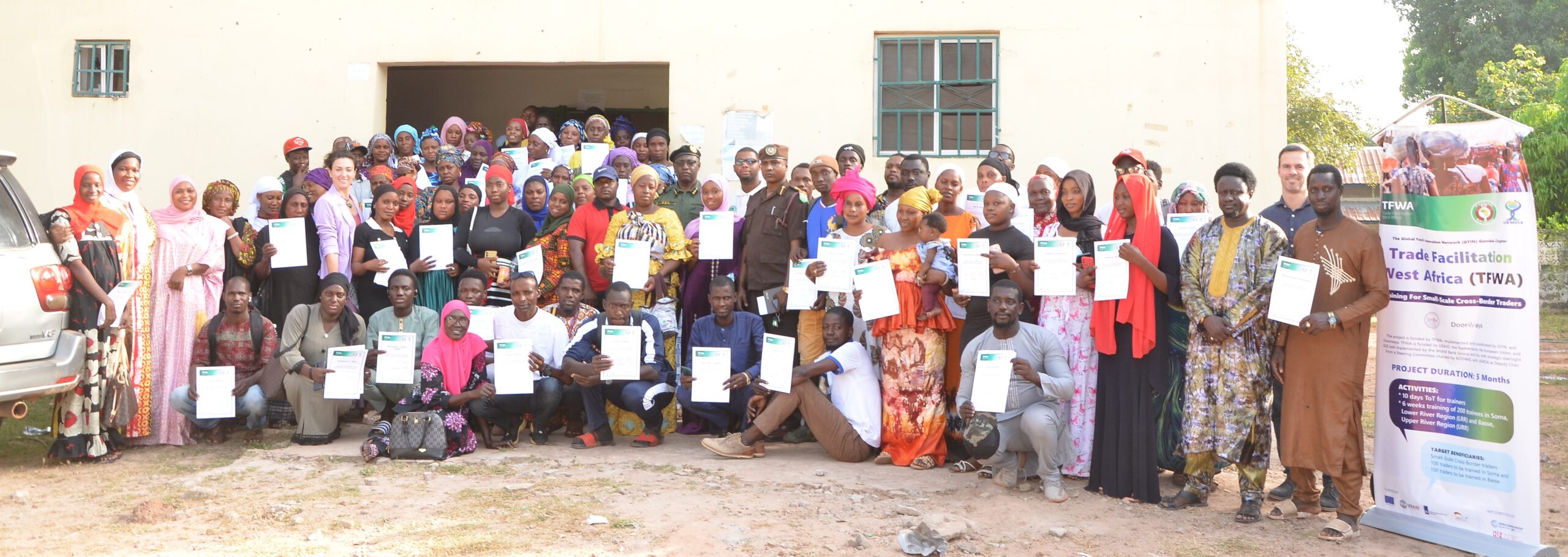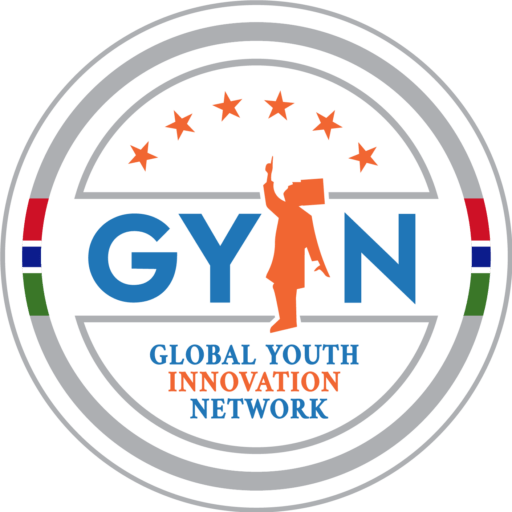
The Trade Facilitation West Africa (TFWA) Program, a six (6) weeks training that enrolled 200 small-scale cross-border traders witnessed the official closing ceremony on 20th and 21st November, 2024 in Soma, Lower River Region (LRR) and Basse in Upper River Region (URR).
As part of the closing ceremonies, an Experience Exchange Workshops were held aimed at empowering 200 small-scale cross-border traders. The workshops facilitated meaningful exchanges between traders and border authorities, addressing systemic barriers like documentation challenges, taxation, and abuse. These discussions highlighted the successes of the training program while fostering mutual understanding and collaboration to enhance trade facilitation.
Among the key achievements of the events include, strengthened relationships between traders and border officials.
The workshop is part of a 5-month project funded by Trade Facilitation West Africa (TFWA) and implemented by GYIN Gambia Chapter in partnership with Doorways gGmbH. TFWA, a collaborative effort funded by The United States Agency for International Development (USAID), the Netherlands, the European Union, and the Deutsche Gesellschaft für Internationale Zusammenarbeit GmbH (GIZ), is implemented by the World Bank Group and GIZ. The program operates under the strategic oversight of a Steering Committee chaired by the Economic Community of West African States (ECOWAS), with the Union économique et monétaire ouest-africaine (UEMOA) as Deputy Chair.
Speaking at the closing ceremonies in Soma and Basse, Mrs. Ida LB Ceesay, Logistics Expert for the TFWA Program in The Gambia and Business Development Officer of GYIN Gambia Chapter expressed gratitude to Customs and The Gambia Immigration Department for their participations on the TFWA Program.
Mrs. Ceesay extended special recognition to Jessica, the World Bank Group representative, for witnessing both the experience exchange workshop and the closing ceremony. She noted that her presence underscored the World Bank Group’s commitment as an implementing partner to the TFWA Program in The Gambia.
Furthermore, Mrs. Ceesay commended Benjamin from Doorways for his attendance at the experience exchange workshop and the official closing. She highlighted Doorways’ significant contribution as an implementing partner throughout the program.
Mamadou Edrisa Njie, Team Leader of the TFWA Program in The Gambia and Executive Director of GYIN Gambia Chapter acknowledged the collective efforts of all partners involved in the program’s implementation. He gave special recognition to the trainers- Mr. Ousman Ndow, Omar Jabang and Ndey Awa Ceesay for their outstanding work. Finally, he congratulated all the small-scale cross-border traders who successfully completed the intensive 6-week training sessions.
Jessica Marguerite Antista, representing the World Bank Group, delivered a comprehensive address highlighting the significance of the Trade Facilitation West Africa (TFWA) Program and its impact on small-scale cross-border traders in The Gambia.
She began by emphasising the power of trade as a driver of employment, growth, development, and poverty reduction. She acknowledged the challenges faced by Gambian traders, particularly their limited knowledge of trade rules and regulations, which hinder their potential to contribute fully to their families and the national economy.
She then introduced the TFWA Program, a collaborative effort created by the European Union, USAID, the Netherlands, and the German Development Cooperation Agency. The program, according to her, aims to improve the region’s free and efficient movement of goods by reducing trade costs and strengthening regional trading networks. Being implemented by the World Bank Group and GIZ, the program operates under the strategic oversight of a Steering Committee chaired by the ECOWAS Commission.
Ms. Antista outlined the program’s key objectives: improving trade facilitation measures, enhancing the movement of goods along selected corridors, and reducing barriers for small-scale traders, with a special focus on women. She highlighted the program’s emphasis on creating safer trade environments at borders, noting that women represent up to 80% of cross-border traders.
The World Bank representative detailed the research and assessment efforts, including a field survey to understand trader characteristics and challenges and a Capacity Building Needs Assessment of Trader Associations in nine West African countries. These efforts informed the development of a comprehensive training methodology covering both technical and behavioral aspects.
Ms. Antista noted that the 6-week training program implemented in The Gambia had covered 12 key modules ranging from proactive behavior to conflict management. She commended the participants for their dedication and perseverance throughout the training.
In her closing remarks, Ms. Antista urged the traders to apply their newly acquired knowledge, respect their obligations, and stand up for their rights. She encouraged collaboration between traders and border authorities to create a safe and efficient trade environment.
Finally, she expressed optimism about the program’s potential to help overcome business challenges and drive broader positive impacts on families, communities, and the nation as a whole. Ms. Antista’s address underscored the TFWA Program’s comprehensive approach to empowering small-scale cross-border traders and its potential to drive economic growth and development in The Gambia and the wider West African region.
She concluded: “I am optimistic that the capacity built here will help you to overcome challenges to your businesses, to benefit your families, your communities and as a result, the nation of the Gambia.”
